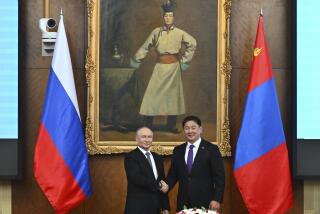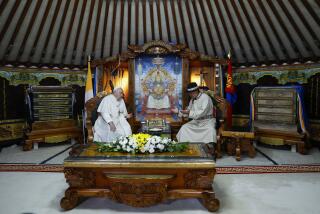Dalai Lama, in Mongolia, Gets Tumultuous Welcome
- Share via
ULAN BATOR, Mongolia — The Dalai Lama, spiritual head of Tibetan Buddhism, arrived to a tumultuous welcome in this deeply religious nation Friday, then declared that the resurgence of Buddhism here offers hope for freedom in Tibet.
The Mongolian people have traditionally believed in Tibetan Buddhism. But the faith was brutally suppressed in a 1930s wave of Stalinist-style terror launched by a Communist regime that took power in 1921. Religion faced severe repression until last year, when the wave of political liberation sweeping Eastern Europe and the Soviet Union reached Mongolia.
The Dalai Lama’s arrival, thus, marks restoration of the faith he leads in one of its traditional strongholds. China’s Communist government, which depends on brutal political repression to maintain its control of Tibet, has expressed strong displeasure at the visit, apparently out of concern for possible repercussions in Tibet.
The renewed practice of Tibetan Buddhism in Mongolia augurs well for Tibet’s future, the Dalai Lama told foreign reporters after leading Mongolian monks in a worship service at Ulan Bator’s Gandan Monastery.
“Tibet is still in a dark period,” he said. But “this shows that the basic human spirit, or human desire, or human love for liberty and freedom, has real strength. In the long run, the human spirit is stronger than external weapons or force.”
The Dalai Lama added that “the (political) events even in Moscow are something incredible.”
Then, in a comment implying that Tibetan Buddhism may have greater staying power in vast regions within China’s current borders than does communism, he declared: “I really feel it is extremely important to make proper plans for the development of Buddhism according to new circumstances.” He left the monastery without any further explanation.
In a statement issued last week complaining about Mongolia’s plan to allow the Dalai Lama to visit, the Chinese Foreign Ministry declared that “while in exile abroad, the Dalai Lama has been engaged in political activities aimed at splitting China under the cover of religion. We are opposed to visits by the Dalai Lama in whatever capacity to countries having diplomatic relations with China,” the Chinese spokesman said.
A Mongolian Foreign Ministry official said Friday that “the Chinese are very angry that the Dalai Lama is in Mongolia.” The Mongolian government, anxious to avoid unnecessary tensions in its relations with Beijing, has publicly stressed that the Dalai Lama is here on an unofficial visit hosted by Gandan Monastery.
The Dalai Lama has visited Mongolia twice before, in 1979 and 1982, but at that time Buddhism faced severe repression here, with religious practice limited to a few token monasteries.
On Friday, about 10,000 people, some in traditional Mongolian robes and others in Western garb, turned out to welcome the Dalai Lama to Gandan Monastery. In a chaotic scene, people rushed his black Mercedes limousine, trying to touch the car, as police struggled to control the crowd. Many others held up blue silk scarves in a gesture of welcome.
Larger numbers are expected to see him at events scheduled for today in an open-air stadium here, including many people from outside Ulan Bator.
“Now, we feel very free to see the Dalai Lama,” said Burd, a 45-year-old factory worker in the crowd outside the crimson front gate of Gandan. “Before (on his earlier visits), it was also possible, but if someone from the Communist Party found out, it would not be good for me.”
In his comments to reporters, the Dalai Lama noted that “the ancient, deep, unique relation between Tibetan and Mongol is still very, very alive, very strong. Of course, we consider Mongol and Tibetan like twin brothers and sisters, culturally, in our way of life, and I think also in recent decades of experience,” he said.
The Dalai Lama did not speak at length on any political conclusions about this relationship. But John Avedon, an authority on the modern history of Tibet who is traveling with the Dalai Lama’s entourage, said that, given the centuries-long history of close Mongol-Tibetan ties, the Dalai Lama’s visit here “politically is an extremely significant event, even though on the surface it may not be classed in that category.”
“The historical legacy is something that should be kept in mind,” Avedon said. “The Chinese are extremely sensitive about the Dalai Lama being in Mongolia . . . given the nature of historical events (in the world) in the past few weeks alone, they can’t help but be very worried about it.”
While Tibet was part of the Qing Dynasty empire, it had de facto independence from the 1911 fall of the Qing until Beijing established Chinese Communist control in 1951. Believers in Tibetan Buddhism live in an arc that stretches from the northernmost part of India through the Himalaya Mountains, Tibet, the Chinese provinces of Qinghai, Gansu and inner Mongolia, Mongolia itself, and parts of southern Siberia.
More to Read
Sign up for Essential California
The most important California stories and recommendations in your inbox every morning.
You may occasionally receive promotional content from the Los Angeles Times.













